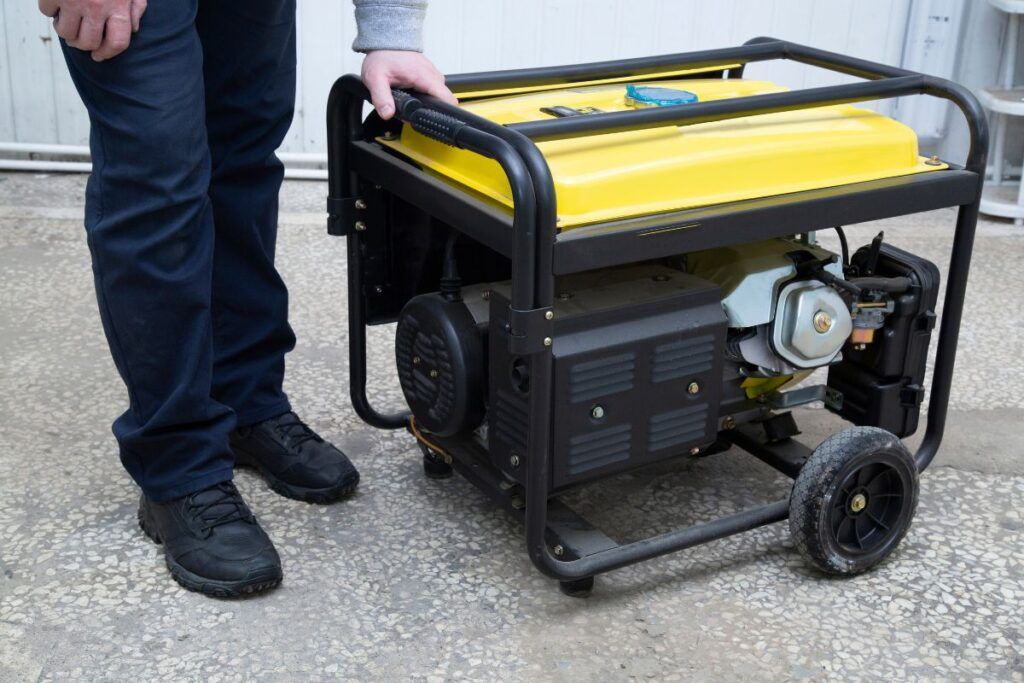Suppose you couldn’t pump water from your well due to unreliable electricity near the well. You might have thought of running it with a generator in that case. If you want to learn more about it, you are at the right place.
In general, you can run a well pump with a generator of the appropriate size. You must ensure the generator can handle the wattage requirement of the well pump. A 1 HP pump will need 3-4 KW of power to start and 1 KW to run, so you must size your generator accordingly.
In this article, you will learn how to calculate the wattage requirement of the well pump to choose the correct generator size. So, keep reading.

Check out our list of top-handpicked products for all your electrical, appliance, and HVAC system needs to keep your home running smoothly.
This post includes some affiliate links.Understanding the Relationship between Well Pumps and Generators
Being in the city, we may not know from where we are getting water to our taps. Recently I visited my friend who is in the countryside.
He is getting water filled in the tanks from the well. And he is using a well pump to get the water up from the well.
At that time, I asked where he was sourcing electricity.
He said he was using a generator to power up the well pump to bring the water to the tanks.
I asked him if running a well pump with a generator was possible.
He told me it was possible and explained how he chose the right generator size and power requirement for the well pump and generators.
It was a learning experience, and I am sharing it with you.
Let’s start by getting a basic understanding of well pumps and generators.
In ancient days, water was drawn from the well using a rope and a bucket.
But that’s not the same case now. In modern times, well pumps draw water from the well directly to the storage tanks.
Well pumps are electrical device that uses a motor to draw water from the well and direct the water to the storage tanks.
It needs a steady source of electricity to pump the water continuously.
A Well may be located too far from the home where the electric grit may not be available.
In such a case, a generator can power up the well pump.
In my friend’s case, the electric source was not reliable for him, so he was using a generator to run the well pump.
A generator is operated by the motor, which turns the generator’s head.
It is powered by using diesel. Propane. Natural gas, gasoline, and other fuels.
A generator converts mechanical energy into electrical energy by rotating the generator’s head using a motor.
While choosing a generator to power up the well pump.
It is important to check whether the generator can supply enough electricity for the well pump to run its motor.
A generator is connected to the well pump using a transfer switch.
When the power is unavailable, the transfer switch is switched on, and I supply electricity to the well pump.
Generator Sizing for Well Pumps: A Comprehensive Guide

The generator’s size depends on the well pump’s wattage requirement.
Different electronic devices require different wattages to function.
So, it is hard to determine the generator’s size without knowing the well pumps’ wattage requirement.
An electric device like a well pump has different starting and running wattage.
The running wattage is lower than the starting wattage.
The wattage requirement of the well pump is measured with the unit HP which expands as Horsepower.
It is also measured with kilowatts in some cases.
Let me explain it with an example.
As I enquired with my friend, he said his well pump’s wattage requirement was ½ HP, so the starting wattage of the 2000 watts and the running wattage is 900 watts.
To calculate the wattage requirement, you must know the value of HP, where 1 HP equals 746 watts.
With this value, you can calculate the wattage requirement of your well pump.
Here is the table attachment to calculate the wattage requirement of the well pump.
| Well pump size | Starting wattage | Running wattage |
|---|---|---|
| ⅓ HP Well Pump | 1500 watt | 750 watts |
| ½ HP Well Pump | 2000 watt | 900 watts |
| ¾ HP Well Pump | 3000 watt | 1500 watts |
| 1 HP Well Pump | 4000 watt | 2000 watts |
| 1½ HP Well Pump | 5000 watt | 2500 watts |
| 2 HP Well Pump | 7500 watt | 3750 watts |
Using this table, you can calculate the wattage requirement of your well pump and choose a generator capable of supplying the required electricity.
Also read: 8 Best Generator With Low THD (Inverter, Dual Fuel & Other Options)
What Size Generator Do I Need to Run My Well Pump?
Let’s say you have a well pump with 1 hp.
The starting wattage will be 4000 watts, and the running wattage will be 2000 watts.
Experts suggest having a generator with 10 % more wattage than the starting wattage requirement of the electric well pump.
If so, the ideal size of the generator is approximately 4500 wattage.
Choosing the Right Generator for Your Well Pump: Factors to Consider:
Consider these factors while choosing a generator for a well pump:
Type of generator
In the market, you can find three types of generators.
They are; inverters, standby, and conventional generators.
Inverter and conventional generators come under portable generators.
It means you can move the generator according to your convenience.
In comparison, the standby generators are installed in a permanent place that cannot be moved.
While buying a generator, consider this factor, and a generator will be suitable for your needs.
Power rating
The next important factor is the power requirement.
The generator’s size must be capable of supplying power to the well pump.
The well pump’s starting and running wattage requirement is on its label.
The generator will find its wattage capacity.
You can compare both and choose a generator capable of running a well pump.
The integrity of the generator
While buying the generator, check if the materials used to build it are durable and resistant to harsh climatic conditions.
Because the materials used to build the generator determine the long-lasting quality of the generator.
It is common for the generator to vibrate. Check if the generators are built with vibrational pads.
Fuel efficiency
Consider the generator’s fuel efficiency while running the well pump using it.
If it requires high fuel to convert it into electricity, the cost of operation will be high.
So, consider referring to the professionals to choose a generator with good fuel efficiency.
Type of fuel used
Generators use oil, natural gas, diesel, and gasoline to produce electricity.
The cost of each fuel varies. In comparison, buying a generator, checking which fuel is efficient and which comes on your budget.
Doing this will ensure an efficient electricity supply at less cost.
Running a Well Pump with a Generator: Tips and Tricks

Here are the tips and tricks you can follow while running a well pump with a generator:
The voltage of the generator
The voltage requirement of the well pump ranges from 115 v to 230 v.
Before connecting the well pump with the generator, check if the generator can provide enough voltage support to the well pump.
In some cases, the voltage requirement of the well pump might be higher than a generator can provide.
In such a case, you can install a transformer to meet the voltage needs.
Power requirement of the well pump
The next thing is to consider the power requirement of the well pump.
A well pump requires 10 amps to draw the water.
Check if your generator can produce enough power to operate the well pump.
Location of the generator
It is recommended to place the generator near the well pump to reduce power wastage during the transfer between two devices.
Ensure your generator is grounded to avoid electrical injuries during an unexpected power surge.
During the winter season, there is more possibility for the generator to get damaged.
So, it is advised to turn off and store the generator in a dry area to prevent it from malfunctioning.
Check the generator regularly for water damage and other issues to prevent expensive repairs.
GFCI configuration
Ground fault circuit interrupter is the safety configuration to protect the well pump from the current loss.
A GFCI configuration is designed to shut off the well pump when a mishap occurs to prevent electrocution.
Wiring the unit properly
It is recommended to use heavy 8 gauge wires to prevent the voltage drop.
If you are using thin wires, it will cause a voltage drop and will result in efficient functioning.
Inspecting the power cord
Inspect the power cord regularly to find any damages and faults.
If the power cord is damaged, replace it immediately.
Check if the power cord is plugged well before switching it on.
Do not overload the generator.
It is not a good idea to connect more devices to the generator than it can handle.
Overloading a generator will cause electrical hazards, and a generator will start to overheat.
If you are using an extension cord, check if it is meant for outdoor usage.
It would be best to use a heavy-duty extension cord to prevent hazards.
Location of the unit
While placing the generator, ensure the location has enough ventilation and no flammable materials around it.
It is not recommended to place a generator near doors and windows to prevent the formation of carbon monoxide.
Generator and Well Pump Compatibility: What You Need to Know?
Checking the compatibility between a well pump and generator involves inspecting the voltage, power, and wattage requirement.
Refer to the table given to calculate the well pump’s wattage requirement and check its voltage requirement in the user manual.
Buy a generator capable of providing the power and voltage needed for the well pump to draw the water.
Portable vs. Stationary Generators for Well Pump Operations:
Portable generators are flexible to change the location, whereas stationary generators are fixed in a place.
Stationary generators must be professionally installed, whereas portable generators do not need professional installation but require a proper storage area.
Stationary generators are designed to function automatically.
It means when the power cut occurs, it will turn on automatically.
In comparison, portable generators must be switched on manually.
Stationary generators use natural gas to produce electricity and do not need refueling.
Portable generators are operated by gasoline, and you need to refuel them.
Stationary generators can handle more load, whereas portable generators handle only specific wattage requirements.
Based on this, you can compare the generator to choose which suits you best.
Overcoming Challenges When Running a Well Pump with a Generator

There are challenges while running a well pump with a generator. Some of the crucial challenges are:
- Fuel consumption.
- Maintenance.
- Noise pollution.
You can overcome the high fuel consumption by choosing energy-efficient fuel.
When it comes to the long life of generators, maintenance plays an important role. So, follow the maintenance schedule to prevent issues.
You can overcome noise pollution by upgrading to a noise-reducing generator or installing insulation.
You can also place the generator far from home to reduce noise pollution.
Related Articles:
- Can You Run A Furnace With A Generator?
- Can You Run A Microwave With A Generator?
- Can You Run A Washing Machine With A Generator?
Final thoughts
It is possible to run the well pump with a generator if it has enough wattage and power output capacity to run the motor in the well pump. Different electrical well pumps will have different wattage requirements. The HP ( Horse Power ) determines the well pump’s wattage requirement.
Refer to the table given in the article to calculate the wattage requirement. You must also follow all the tips and tricks mentioned in the article for the efficient functioning of the well pump. There are three types of generators. It is important to analyze your requirement to choose the right generator to suit your requirement.
If you plan to run your well pump with the generator, consider hiring a professional to do the installation. I have shared everything I learned from the experience of visiting my friend in the countryside. I hope you found all the information and tips useful.
Can you run a well pump with an inverter generator?
Inverter generators can be used with the well pump if you are not required to pump a high volume of water.
How deep can a 1hp well pump go?
1 HP well pump can pump water up to 221 ft
Reference link: Well pump; Electric generator

